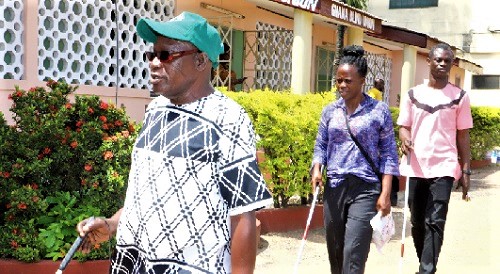Cataract remains the leading cause of blindness in Ghana, with about 165,000 Ghanaians currently blind as a result of the condition.
This figure represents more than half of the country’s total blind population, estimated at 250,000.
Each year, new cataract-related blindness cases account for about 20 per cent of the previous year’s total.
This was revealed by the Head of the National Eye Care Unit of the Ghana Health Service (GHS), Dr. Hornametor Afake, during the media launch of this year’s World Sight Day in Accra yesterday.
World Sight Day
World Sight Day is observed annually to raise awareness about blindness and visual impairment, advocate for accessible and quality eye care, and encourage collective action at all levels.
In Ghana, the day serves as an opportunity to reflect on achievements, confront challenges, and reaffirm the commitment to ensuring that no Ghanaian is needlessly blind or visually impaired.
This year’s commemoration was held under the theme: “Increasing access to quality eye care in Ghana.”
Globally, 2.2 billion people live with vision impairment or blindness, and nearly one billion of these cases could have been prevented or remain unaddressed.
In Ghana, a 2015 survey revealed that 1.07 per cent of the population, representing 360,000 people, had severe visual impairment. It also found that 67.74 percent of the blind live in communities with little to no access to quality eye care services.
Glaucoma and Other Eye Diseases
Dr. Afake noted that glaucoma is the second leading cause of blindness in Ghana, affecting 60,000 people, or 19.4 per cent of the country’s blind population.
He added that posterior segment diseases, including diabetic retinopathy and corneal opacities, account for 12.9 per cent and 11.2 per cent, respectively.
Unfortunately, Ghana performs fewer than 30,000 cataract surgeries annually, resulting in an average cataract surgical rate (CSR) of about 712 over the past five years, and 860 CSR over the past three years.
Dr. Afake explained that ideally, 68,000 cataract surgeries should be performed each year to clear the existing backlog within three years.
“Currently, our surgical cataract coverage is about 18 per cent. This means that for every 100 cataract patients who need surgery in this country, only 18 per cent of them have received surgery. This calls for urgent action to increase access, especially in the newly created regions,” he added.
He attributed the shortfall to inadequate human resources and limited equipment, particularly for subspecialty care. Ghana currently has 141 ophthalmologists, 570 optometrists, 900 ophthalmic nurses, and 800 opticians.
While these numbers reflect progress compared to previous decades, Dr. Afake emphasized that the distribution remains uneven, with rural and underserved regions facing severe shortages.
He highlighted that six regions — Western North, Savannah, North East, Upper West, Upper East, and Oti — have no ophthalmologists, underscoring the equity gap in eye care access.
He further mentioned that financial barriers, low awareness leading to late presentation of diseases such as glaucoma and diabetic retinopathy, and insufficient funding for eye health programmes continue to hinder progress.
Eye Screening and Public Awareness
The Director of the Family Health Division of the GHS, Dr. Kennedy Britson, encouraged the public to undergo regular eye screenings and avoid using unapproved substances in their eyes.
“If your eyesight is disturbing you, please seek quick help. Don’t try and pick somebody’s glasses and try them on. Your problem may be different,” he advised.
The immediate past president of the Ophthalmological Society of Ghana, Dr. Dzifa Ofori-Adjei, urged citizens to become advocates for eye health by getting their eyes tested regularly and encouraging others to do the same.
She also appealed to the government to invest in eye health infrastructure, ensure equitable distribution of professionals, and pass key legislation to support organ and tissue regulation and improve service quality.
The Director of Technical Coordination at the Ministry of Health, Dr. Hafez Adam Taher, reaffirmed the ministry’s commitment to improving access to quality healthcare services, noting that eye health remains a vital part of Ghana’s broader health agenda.
Other speakers included the Director-General of the GHS (whose speech was delivered on his behalf) and the Country Chairman of Global Eye Summit, Dr. Boateng Wiafe.






